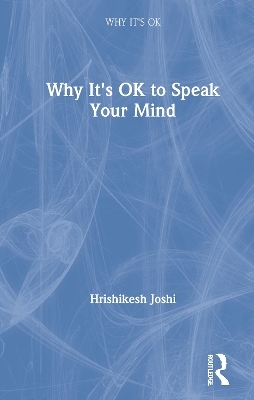
Why It's OK to Speak Your Mind
Seiten
2021
Routledge (Verlag)
978-0-367-14171-4 (ISBN)
Routledge (Verlag)
978-0-367-14171-4 (ISBN)
Joshi offers a novel defense of speaking your mind, drawing from Aristotle, John Stuart Mill, Friedrich Nietzsche, Bertrand Russell, and a range of contemporary thinkers. He argues that speaking our own unique perspective is essential not only for not only our personal well being but also for our collective good.
Political protests, debates on college campuses, and social media tirades make it seem like everyone is speaking their minds today. Surveys, however, reveal that many people increasingly feel like they’re walking on eggshells when communicating in public. Speaking your mind can risk relationships and professional opportunities. It can alienate friends and anger colleagues. Isn’t it smarter to just put your head down and keep quiet about controversial topics?
In this book, Hrishikesh Joshi offers a novel defense of speaking your mind. He explains that because we are social creatures, we never truly think alone. What we know depends on what our community knows. And by bringing our unique perspectives to bear upon public discourse, we enhance our collective ability to reach the truth on a variety of important matters.
Speaking your mind is also important for your own sake. It is essential for developing your own thinking. And it’s a core aspect of being intellectually courageous and independent. Joshi argues that such independence is a crucial part of a well-lived life.
The book draws from Aristotle, John Stuart Mill, Friedrich Nietzsche, Bertrand Russell, and a range of contemporary thinkers to argue that it’s OK to speak your mind.
Key Features
Shows that we have not just a right but a moral duty to publicly share what we know.
Argues that discussing your unique ideas with others is essential for developing as a critical thinker.
Explores the value of intellectual honesty and independence in the writings of John Stuart Mill and Friedrich Nietzsche and connects their thinking to contemporary problems.
Argues that avoiding cultural blind spots today is important for the fate of future generations.
Political protests, debates on college campuses, and social media tirades make it seem like everyone is speaking their minds today. Surveys, however, reveal that many people increasingly feel like they’re walking on eggshells when communicating in public. Speaking your mind can risk relationships and professional opportunities. It can alienate friends and anger colleagues. Isn’t it smarter to just put your head down and keep quiet about controversial topics?
In this book, Hrishikesh Joshi offers a novel defense of speaking your mind. He explains that because we are social creatures, we never truly think alone. What we know depends on what our community knows. And by bringing our unique perspectives to bear upon public discourse, we enhance our collective ability to reach the truth on a variety of important matters.
Speaking your mind is also important for your own sake. It is essential for developing your own thinking. And it’s a core aspect of being intellectually courageous and independent. Joshi argues that such independence is a crucial part of a well-lived life.
The book draws from Aristotle, John Stuart Mill, Friedrich Nietzsche, Bertrand Russell, and a range of contemporary thinkers to argue that it’s OK to speak your mind.
Key Features
Shows that we have not just a right but a moral duty to publicly share what we know.
Argues that discussing your unique ideas with others is essential for developing as a critical thinker.
Explores the value of intellectual honesty and independence in the writings of John Stuart Mill and Friedrich Nietzsche and connects their thinking to contemporary problems.
Argues that avoiding cultural blind spots today is important for the fate of future generations.
Hrishikesh Joshi is Assistant Professor at Bowling Green State University, and works on moral and political philosophy. He completed his Ph.D. at Princeton University.
Prologue 1. The Epistemic Commons 2. A Duty to Speak Your Mind 3. Challenges and Temptations 4. Developing as a Thinker 5. Independence and the Good Life Epilogue
| Erscheinungsdatum | 11.03.2021 |
|---|---|
| Reihe/Serie | Why It's OK |
| Zusatzinfo | 1 Line drawings, black and white; 1 Illustrations, black and white |
| Verlagsort | London |
| Sprache | englisch |
| Maße | 129 x 198 mm |
| Gewicht | 200 g |
| Themenwelt | Geisteswissenschaften ► Philosophie ► Erkenntnistheorie / Wissenschaftstheorie |
| Geisteswissenschaften ► Philosophie ► Ethik | |
| ISBN-10 | 0-367-14171-X / 036714171X |
| ISBN-13 | 978-0-367-14171-4 / 9780367141714 |
| Zustand | Neuware |
| Informationen gemäß Produktsicherheitsverordnung (GPSR) | |
| Haben Sie eine Frage zum Produkt? |
Mehr entdecken
aus dem Bereich
aus dem Bereich
die Grundlegung der modernen Philosophie
Buch | Softcover (2023)
C.H.Beck (Verlag)
CHF 25,20
Buch | Softcover (2023)
Reclam, Philipp (Verlag)
CHF 9,80

![Was heißt Denken?. Vorlesung Wintersemester 1951/52. [Was bedeutet das alles?] - Martin Heidegger](/media/113619842)
